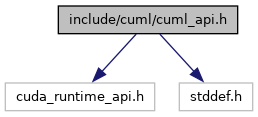#include <cuda_runtime_api.h>#include <stddef.h>
Include dependency graph for cuml_api.h:

This graph shows which files directly or indirectly include this file:

Go to the source code of this file.
Typedefs | |
| typedef int | cumlHandle_t |
| typedef enum cumlError_t | cumlError_t |
| typedef cudaError_t(* | cuml_allocate) (void **p, size_t n, cudaStream_t stream) |
| typedef cudaError_t(* | cuml_deallocate) (void *p, size_t n, cudaStream_t stream) |
Enumerations | |
| enum | cumlError_t { CUML_SUCCESS , CUML_ERROR_UNKNOWN , CUML_INVALID_HANDLE } |
Functions | |
| const char * | cumlGetErrorString (cumlError_t error) |
| Get a human readable error string for the passed in error code. More... | |
| cumlError_t | cumlCreate (cumlHandle_t *handle, cudaStream_t stream) |
| Creates a cumlHandle_t. More... | |
| cumlError_t | cumlGetStream (cumlHandle_t handle, cudaStream_t *stream) |
| sets the stream to which all cuML work issued via the passed handle should be ordered. More... | |
| cumlError_t | cumlSetDeviceAllocator (cumlHandle_t handle, cuml_allocate allocate_fn, cuml_deallocate deallocate_fn) |
| sets the allocator to use for all device allocations done in cuML. More... | |
| cumlError_t | cumlSetHostAllocator (cumlHandle_t handle, cuml_allocate allocate_fn, cuml_deallocate deallocate_fn) |
| sets the allocator to use for substantial host allocations done in cuML. More... | |
| cumlError_t | cumlDestroy (cumlHandle_t handle) |
| Release all resource internally managed by cumlHandle_t. More... | |
Typedef Documentation
◆ cuml_allocate
| typedef cudaError_t(* cuml_allocate) (void **p, size_t n, cudaStream_t stream) |
◆ cuml_deallocate
| typedef cudaError_t(* cuml_deallocate) (void *p, size_t n, cudaStream_t stream) |
◆ cumlError_t
| typedef enum cumlError_t cumlError_t |
◆ cumlHandle_t
| typedef int cumlHandle_t |
Enumeration Type Documentation
◆ cumlError_t
| enum cumlError_t |
Function Documentation
◆ cumlCreate()
| cumlError_t cumlCreate | ( | cumlHandle_t * | handle, |
| cudaStream_t | stream | ||
| ) |
Creates a cumlHandle_t.
- Parameters
-
[in,out] handle pointer to the handle to create. [in] stream the stream to which cuML work should be ordered.
- Returns
- CUML_SUCCESS on success,
- Todo:
- : add more error codes
◆ cumlDestroy()
| cumlError_t cumlDestroy | ( | cumlHandle_t | handle | ) |
Release all resource internally managed by cumlHandle_t.
- Parameters
-
[in,out] handle the cumlHandle_t to destroy.
- Returns
- CUML_SUCCESS on success,
- Todo:
- : add more error codes
◆ cumlGetErrorString()
| const char* cumlGetErrorString | ( | cumlError_t | error | ) |
Get a human readable error string for the passed in error code.
- Parameters
-
[in] error the error code to decipher.
- Returns
- a string with a human readable error message.
◆ cumlGetStream()
| cumlError_t cumlGetStream | ( | cumlHandle_t | handle, |
| cudaStream_t * | stream | ||
| ) |
sets the stream to which all cuML work issued via the passed handle should be ordered.
- Parameters
-
[in,out] handle handle to set the stream for. [in] stream the stream to which cuML work should be ordered.
- Returns
- CUML_SUCCESS on success,
- Todo:
- : add more error codes
◆ cumlSetDeviceAllocator()
| cumlError_t cumlSetDeviceAllocator | ( | cumlHandle_t | handle, |
| cuml_allocate | allocate_fn, | ||
| cuml_deallocate | deallocate_fn | ||
| ) |
sets the allocator to use for all device allocations done in cuML.
Example use:
cudaError_t device_allocate(void** p,size_t n, cudaStream_t)
{
return cudaMalloc(p,n);
}
cudaError_t device_deallocate(void* p, size_t, cudaStream_t)
{
return cudaFree(p);
}
void foo()
{
cumlHandle_t cumlHandle;
cumlCreate( &cumlHandle );
cumlSetDeviceAllocator( cumlHandle, device_allocate, device_deallocate );
cumlDestroy( cumlHandle );
}
cumlError_t cumlCreate(cumlHandle_t *handle, cudaStream_t stream)
Creates a cumlHandle_t.
Definition: cuml_api.cpp:26
cumlError_t cumlDestroy(cumlHandle_t handle)
Release all resource internally managed by cumlHandle_t.
Definition: cuml_api.cpp:55
cumlError_t cumlSetDeviceAllocator(cumlHandle_t handle, cuml_allocate allocate_fn, cuml_deallocate deallocate_fn)
sets the allocator to use for all device allocations done in cuML.
- Parameters
-
[in,out] handle the cumlHandle_t to set the device allocator for. [in] allocate_fn function pointer to the allocate function to use for device allocations. [in] deallocate_fn function pointer to the deallocate function to use for device allocations.
- Returns
- CUML_SUCCESS on success,
- Todo:
- : add more error codes
◆ cumlSetHostAllocator()
| cumlError_t cumlSetHostAllocator | ( | cumlHandle_t | handle, |
| cuml_allocate | allocate_fn, | ||
| cuml_deallocate | deallocate_fn | ||
| ) |
sets the allocator to use for substantial host allocations done in cuML.
Example use:
cudaError_t host_allocate(void** p,size_t n, cudaStream_t)
{
*p = malloc(n);
return NULL != *p ? cudaSuccess : cudaErrorUnknown;
}
cudaError_t host_deallocate(void* p, size_t, cudaStream_t stream)
{
free(p);
return cudaSuccess;
}
void foo()
{
cumlHandle_t cumlHandle;
cumlCreate( &cumlHandle );
cumlSetHostAllocator( cumlHandle, host_allocate, host_deallocate );
cumlDestroy( cumlHandle );
}
cumlError_t cumlSetHostAllocator(cumlHandle_t handle, cuml_allocate allocate_fn, cuml_deallocate deallocate_fn)
sets the allocator to use for substantial host allocations done in cuML.
- Parameters
-
[in,out] handle the cumlHandle_t to set the host allocator for. [in] allocate_fn function pointer to the allocate function to use for host allocations. [in] deallocate_fn function pointer to the deallocate function to use for host allocations.
- Returns
- CUML_SUCCESS on success,
- Todo:
- : add more error codes